Study Skills for Academic Success in Higher Education
VerifiedAdded on 2023/01/13
|7
|1429
|59
Homework Assignment
AI Summary
This assignment delves into the critical role of study skills in higher education, emphasizing the importance of setting both short-term and long-term academic goals to achieve success. The document explores the significance of goals, highlighting their ability to improve focus, increase motivation, enhance the quality of education, and provide measurable results. It differentiates between short-term goals, such as those aimed at exam preparation, and long-term goals, such as achieving a specific grade over the semester. The assignment also outlines effective methods to improve comprehension and retention, including the SMART approach to goal setting, note-taking techniques, and the development of new skills. The conclusion underscores the importance of writing, focus, and listening skills in enhancing retention and overall academic performance, providing a comprehensive guide to students seeking to optimize their study habits and achieve their academic objectives.
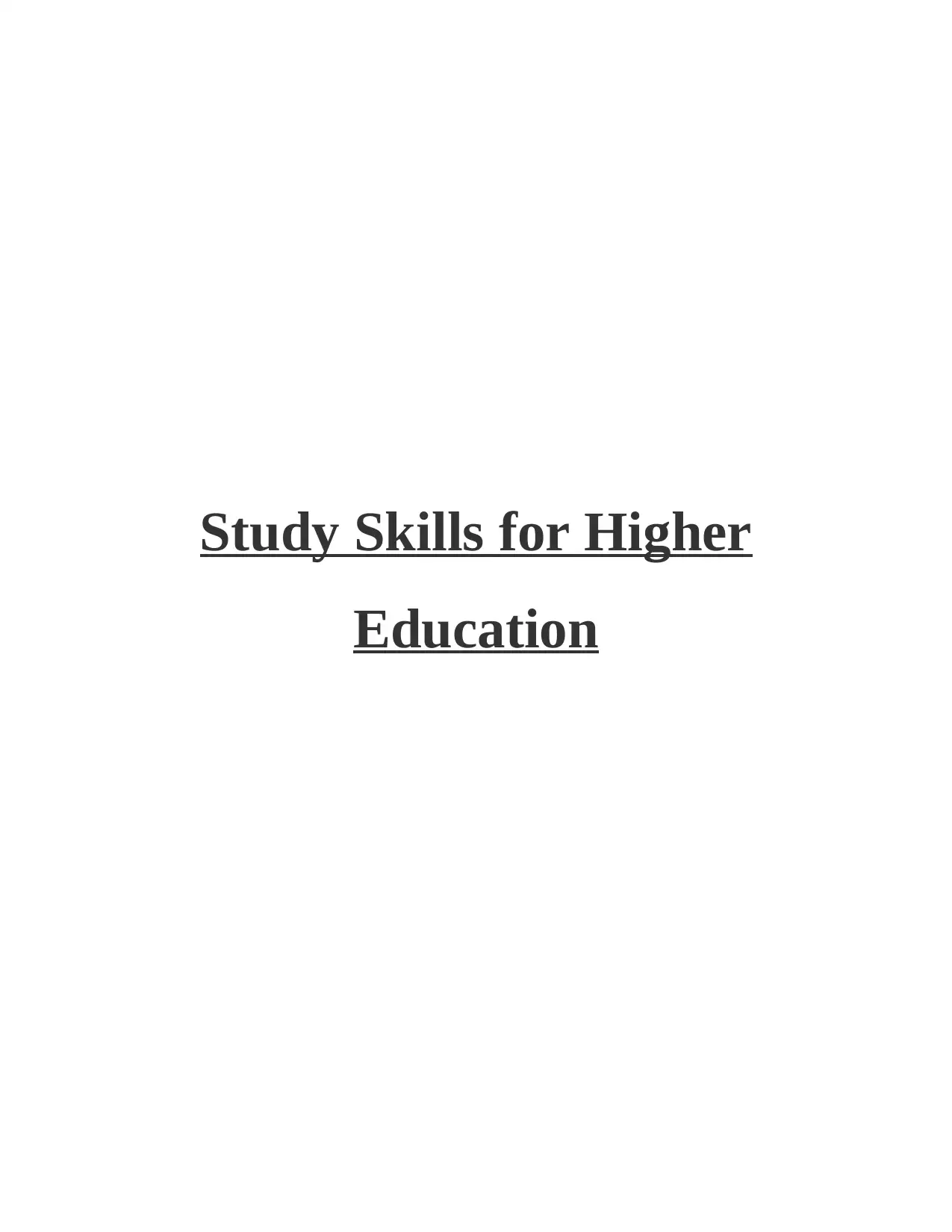
Study Skills for Higher
Education
Education
Paraphrase This Document
Need a fresh take? Get an instant paraphrase of this document with our AI Paraphraser
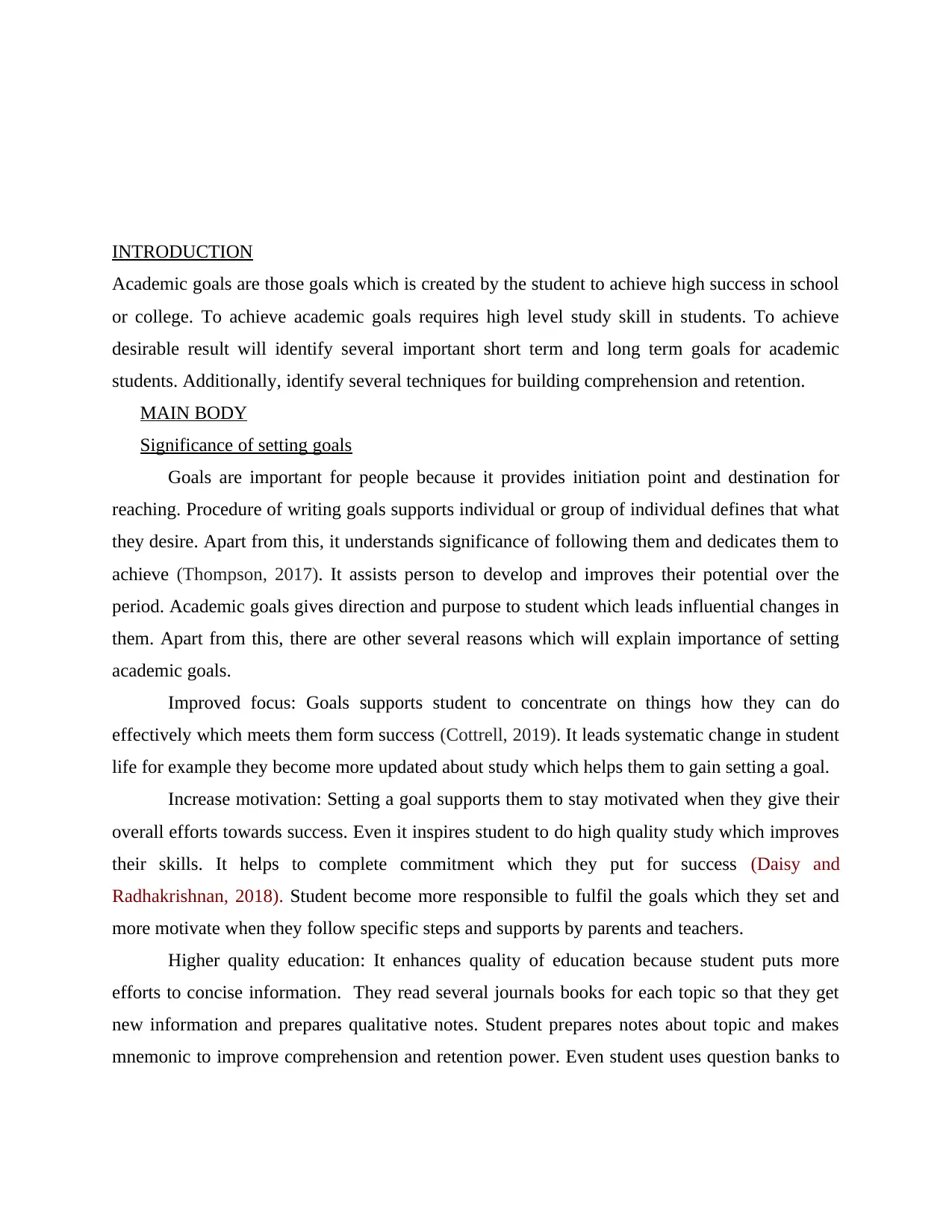
INTRODUCTION
Academic goals are those goals which is created by the student to achieve high success in school
or college. To achieve academic goals requires high level study skill in students. To achieve
desirable result will identify several important short term and long term goals for academic
students. Additionally, identify several techniques for building comprehension and retention.
MAIN BODY
Significance of setting goals
Goals are important for people because it provides initiation point and destination for
reaching. Procedure of writing goals supports individual or group of individual defines that what
they desire. Apart from this, it understands significance of following them and dedicates them to
achieve (Thompson, 2017). It assists person to develop and improves their potential over the
period. Academic goals gives direction and purpose to student which leads influential changes in
them. Apart from this, there are other several reasons which will explain importance of setting
academic goals.
Improved focus: Goals supports student to concentrate on things how they can do
effectively which meets them form success (Cottrell, 2019). It leads systematic change in student
life for example they become more updated about study which helps them to gain setting a goal.
Increase motivation: Setting a goal supports them to stay motivated when they give their
overall efforts towards success. Even it inspires student to do high quality study which improves
their skills. It helps to complete commitment which they put for success (Daisy and
Radhakrishnan, 2018). Student become more responsible to fulfil the goals which they set and
more motivate when they follow specific steps and supports by parents and teachers.
Higher quality education: It enhances quality of education because student puts more
efforts to concise information. They read several journals books for each topic so that they get
new information and prepares qualitative notes. Student prepares notes about topic and makes
mnemonic to improve comprehension and retention power. Even student uses question banks to
Academic goals are those goals which is created by the student to achieve high success in school
or college. To achieve academic goals requires high level study skill in students. To achieve
desirable result will identify several important short term and long term goals for academic
students. Additionally, identify several techniques for building comprehension and retention.
MAIN BODY
Significance of setting goals
Goals are important for people because it provides initiation point and destination for
reaching. Procedure of writing goals supports individual or group of individual defines that what
they desire. Apart from this, it understands significance of following them and dedicates them to
achieve (Thompson, 2017). It assists person to develop and improves their potential over the
period. Academic goals gives direction and purpose to student which leads influential changes in
them. Apart from this, there are other several reasons which will explain importance of setting
academic goals.
Improved focus: Goals supports student to concentrate on things how they can do
effectively which meets them form success (Cottrell, 2019). It leads systematic change in student
life for example they become more updated about study which helps them to gain setting a goal.
Increase motivation: Setting a goal supports them to stay motivated when they give their
overall efforts towards success. Even it inspires student to do high quality study which improves
their skills. It helps to complete commitment which they put for success (Daisy and
Radhakrishnan, 2018). Student become more responsible to fulfil the goals which they set and
more motivate when they follow specific steps and supports by parents and teachers.
Higher quality education: It enhances quality of education because student puts more
efforts to concise information. They read several journals books for each topic so that they get
new information and prepares qualitative notes. Student prepares notes about topic and makes
mnemonic to improve comprehension and retention power. Even student uses question banks to
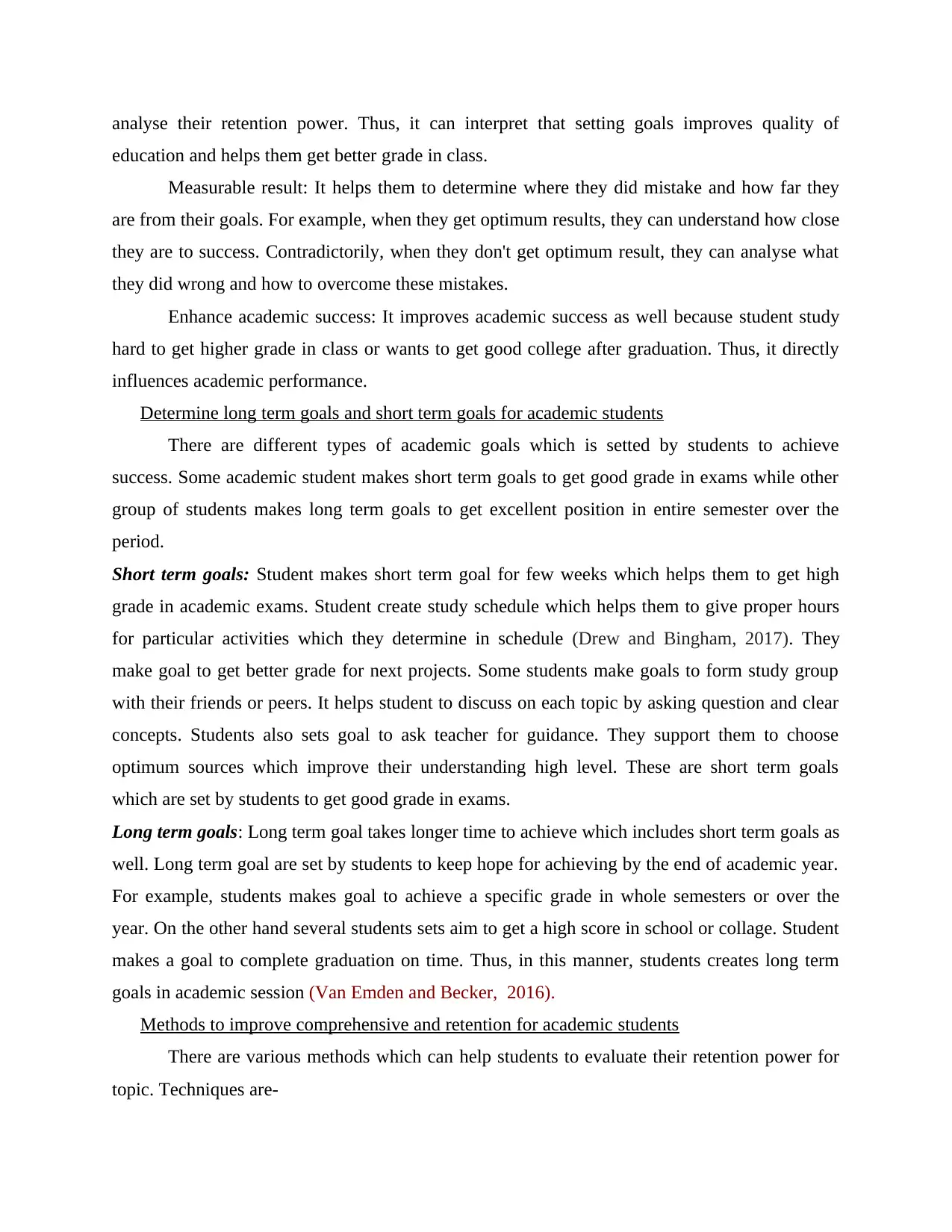
analyse their retention power. Thus, it can interpret that setting goals improves quality of
education and helps them get better grade in class.
Measurable result: It helps them to determine where they did mistake and how far they
are from their goals. For example, when they get optimum results, they can understand how close
they are to success. Contradictorily, when they don't get optimum result, they can analyse what
they did wrong and how to overcome these mistakes.
Enhance academic success: It improves academic success as well because student study
hard to get higher grade in class or wants to get good college after graduation. Thus, it directly
influences academic performance.
Determine long term goals and short term goals for academic students
There are different types of academic goals which is setted by students to achieve
success. Some academic student makes short term goals to get good grade in exams while other
group of students makes long term goals to get excellent position in entire semester over the
period.
Short term goals: Student makes short term goal for few weeks which helps them to get high
grade in academic exams. Student create study schedule which helps them to give proper hours
for particular activities which they determine in schedule (Drew and Bingham, 2017). They
make goal to get better grade for next projects. Some students make goals to form study group
with their friends or peers. It helps student to discuss on each topic by asking question and clear
concepts. Students also sets goal to ask teacher for guidance. They support them to choose
optimum sources which improve their understanding high level. These are short term goals
which are set by students to get good grade in exams.
Long term goals: Long term goal takes longer time to achieve which includes short term goals as
well. Long term goal are set by students to keep hope for achieving by the end of academic year.
For example, students makes goal to achieve a specific grade in whole semesters or over the
year. On the other hand several students sets aim to get a high score in school or collage. Student
makes a goal to complete graduation on time. Thus, in this manner, students creates long term
goals in academic session (Van Emden and Becker, 2016).
Methods to improve comprehensive and retention for academic students
There are various methods which can help students to evaluate their retention power for
topic. Techniques are-
education and helps them get better grade in class.
Measurable result: It helps them to determine where they did mistake and how far they
are from their goals. For example, when they get optimum results, they can understand how close
they are to success. Contradictorily, when they don't get optimum result, they can analyse what
they did wrong and how to overcome these mistakes.
Enhance academic success: It improves academic success as well because student study
hard to get higher grade in class or wants to get good college after graduation. Thus, it directly
influences academic performance.
Determine long term goals and short term goals for academic students
There are different types of academic goals which is setted by students to achieve
success. Some academic student makes short term goals to get good grade in exams while other
group of students makes long term goals to get excellent position in entire semester over the
period.
Short term goals: Student makes short term goal for few weeks which helps them to get high
grade in academic exams. Student create study schedule which helps them to give proper hours
for particular activities which they determine in schedule (Drew and Bingham, 2017). They
make goal to get better grade for next projects. Some students make goals to form study group
with their friends or peers. It helps student to discuss on each topic by asking question and clear
concepts. Students also sets goal to ask teacher for guidance. They support them to choose
optimum sources which improve their understanding high level. These are short term goals
which are set by students to get good grade in exams.
Long term goals: Long term goal takes longer time to achieve which includes short term goals as
well. Long term goal are set by students to keep hope for achieving by the end of academic year.
For example, students makes goal to achieve a specific grade in whole semesters or over the
year. On the other hand several students sets aim to get a high score in school or collage. Student
makes a goal to complete graduation on time. Thus, in this manner, students creates long term
goals in academic session (Van Emden and Becker, 2016).
Methods to improve comprehensive and retention for academic students
There are various methods which can help students to evaluate their retention power for
topic. Techniques are-
⊘ This is a preview!⊘
Do you want full access?
Subscribe today to unlock all pages.

Trusted by 1+ million students worldwide
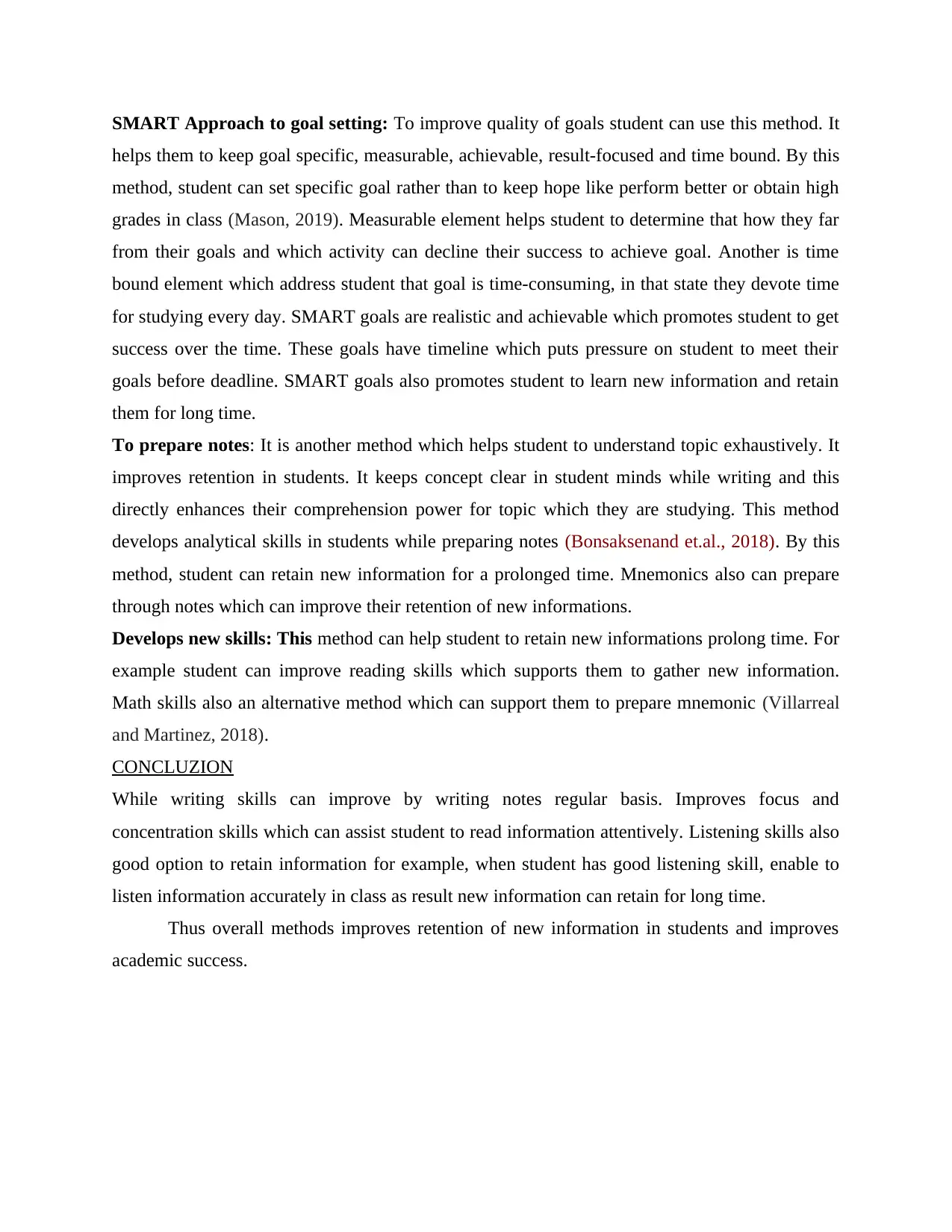
SMART Approach to goal setting: To improve quality of goals student can use this method. It
helps them to keep goal specific, measurable, achievable, result-focused and time bound. By this
method, student can set specific goal rather than to keep hope like perform better or obtain high
grades in class (Mason, 2019). Measurable element helps student to determine that how they far
from their goals and which activity can decline their success to achieve goal. Another is time
bound element which address student that goal is time-consuming, in that state they devote time
for studying every day. SMART goals are realistic and achievable which promotes student to get
success over the time. These goals have timeline which puts pressure on student to meet their
goals before deadline. SMART goals also promotes student to learn new information and retain
them for long time.
To prepare notes: It is another method which helps student to understand topic exhaustively. It
improves retention in students. It keeps concept clear in student minds while writing and this
directly enhances their comprehension power for topic which they are studying. This method
develops analytical skills in students while preparing notes (Bonsaksenand et.al., 2018). By this
method, student can retain new information for a prolonged time. Mnemonics also can prepare
through notes which can improve their retention of new informations.
Develops new skills: This method can help student to retain new informations prolong time. For
example student can improve reading skills which supports them to gather new information.
Math skills also an alternative method which can support them to prepare mnemonic (Villarreal
and Martinez, 2018).
CONCLUZION
While writing skills can improve by writing notes regular basis. Improves focus and
concentration skills which can assist student to read information attentively. Listening skills also
good option to retain information for example, when student has good listening skill, enable to
listen information accurately in class as result new information can retain for long time.
Thus overall methods improves retention of new information in students and improves
academic success.
helps them to keep goal specific, measurable, achievable, result-focused and time bound. By this
method, student can set specific goal rather than to keep hope like perform better or obtain high
grades in class (Mason, 2019). Measurable element helps student to determine that how they far
from their goals and which activity can decline their success to achieve goal. Another is time
bound element which address student that goal is time-consuming, in that state they devote time
for studying every day. SMART goals are realistic and achievable which promotes student to get
success over the time. These goals have timeline which puts pressure on student to meet their
goals before deadline. SMART goals also promotes student to learn new information and retain
them for long time.
To prepare notes: It is another method which helps student to understand topic exhaustively. It
improves retention in students. It keeps concept clear in student minds while writing and this
directly enhances their comprehension power for topic which they are studying. This method
develops analytical skills in students while preparing notes (Bonsaksenand et.al., 2018). By this
method, student can retain new information for a prolonged time. Mnemonics also can prepare
through notes which can improve their retention of new informations.
Develops new skills: This method can help student to retain new informations prolong time. For
example student can improve reading skills which supports them to gather new information.
Math skills also an alternative method which can support them to prepare mnemonic (Villarreal
and Martinez, 2018).
CONCLUZION
While writing skills can improve by writing notes regular basis. Improves focus and
concentration skills which can assist student to read information attentively. Listening skills also
good option to retain information for example, when student has good listening skill, enable to
listen information accurately in class as result new information can retain for long time.
Thus overall methods improves retention of new information in students and improves
academic success.
Paraphrase This Document
Need a fresh take? Get an instant paraphrase of this document with our AI Paraphraser
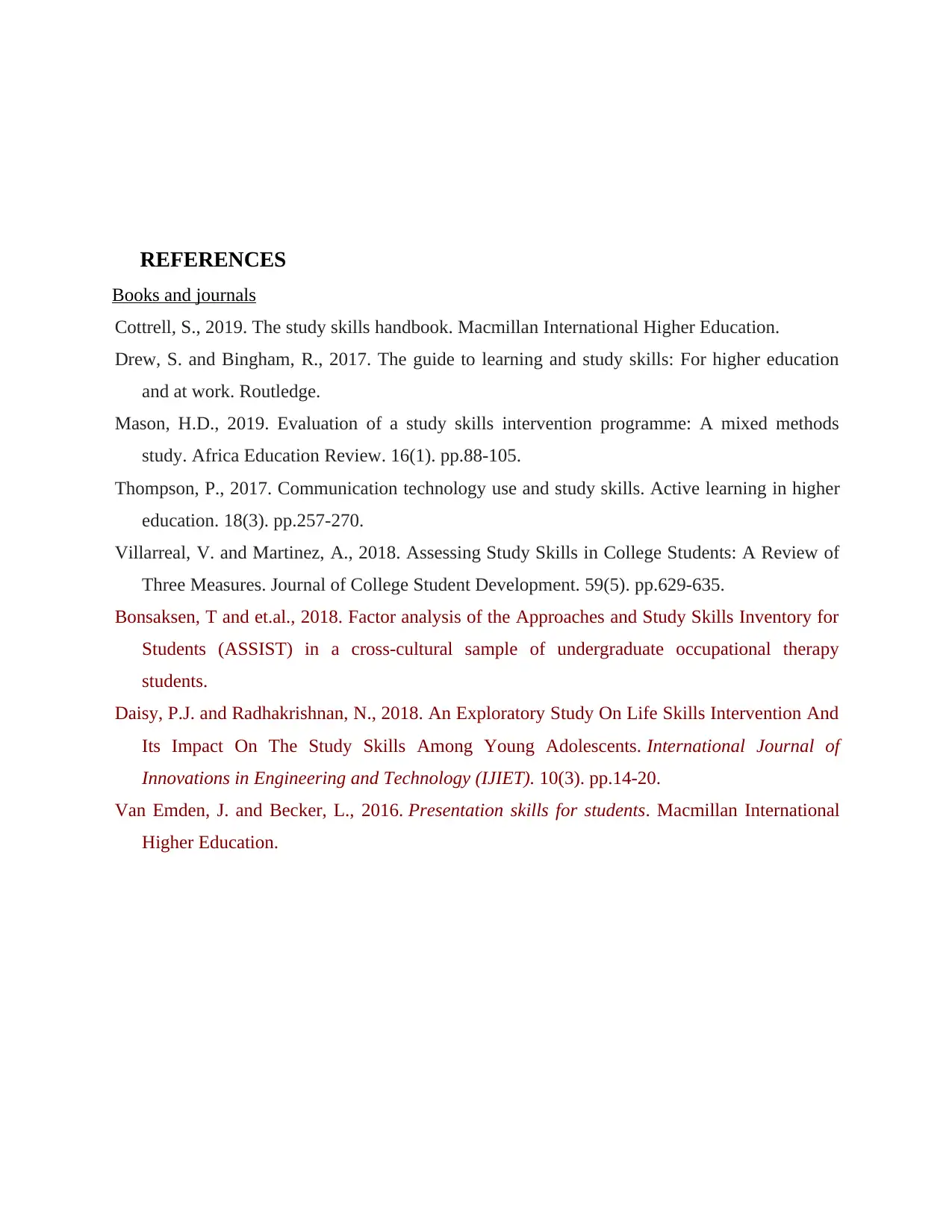
REFERENCES
Books and journals
Cottrell, S., 2019. The study skills handbook. Macmillan International Higher Education.
Drew, S. and Bingham, R., 2017. The guide to learning and study skills: For higher education
and at work. Routledge.
Mason, H.D., 2019. Evaluation of a study skills intervention programme: A mixed methods
study. Africa Education Review. 16(1). pp.88-105.
Thompson, P., 2017. Communication technology use and study skills. Active learning in higher
education. 18(3). pp.257-270.
Villarreal, V. and Martinez, A., 2018. Assessing Study Skills in College Students: A Review of
Three Measures. Journal of College Student Development. 59(5). pp.629-635.
Bonsaksen, T and et.al., 2018. Factor analysis of the Approaches and Study Skills Inventory for
Students (ASSIST) in a cross-cultural sample of undergraduate occupational therapy
students.
Daisy, P.J. and Radhakrishnan, N., 2018. An Exploratory Study On Life Skills Intervention And
Its Impact On The Study Skills Among Young Adolescents. International Journal of
Innovations in Engineering and Technology (IJIET). 10(3). pp.14-20.
Van Emden, J. and Becker, L., 2016. Presentation skills for students. Macmillan International
Higher Education.
Books and journals
Cottrell, S., 2019. The study skills handbook. Macmillan International Higher Education.
Drew, S. and Bingham, R., 2017. The guide to learning and study skills: For higher education
and at work. Routledge.
Mason, H.D., 2019. Evaluation of a study skills intervention programme: A mixed methods
study. Africa Education Review. 16(1). pp.88-105.
Thompson, P., 2017. Communication technology use and study skills. Active learning in higher
education. 18(3). pp.257-270.
Villarreal, V. and Martinez, A., 2018. Assessing Study Skills in College Students: A Review of
Three Measures. Journal of College Student Development. 59(5). pp.629-635.
Bonsaksen, T and et.al., 2018. Factor analysis of the Approaches and Study Skills Inventory for
Students (ASSIST) in a cross-cultural sample of undergraduate occupational therapy
students.
Daisy, P.J. and Radhakrishnan, N., 2018. An Exploratory Study On Life Skills Intervention And
Its Impact On The Study Skills Among Young Adolescents. International Journal of
Innovations in Engineering and Technology (IJIET). 10(3). pp.14-20.
Van Emden, J. and Becker, L., 2016. Presentation skills for students. Macmillan International
Higher Education.

⊘ This is a preview!⊘
Do you want full access?
Subscribe today to unlock all pages.

Trusted by 1+ million students worldwide

1 out of 7
Related Documents
Your All-in-One AI-Powered Toolkit for Academic Success.
+13062052269
info@desklib.com
Available 24*7 on WhatsApp / Email
![[object Object]](/_next/static/media/star-bottom.7253800d.svg)
Unlock your academic potential
Copyright © 2020–2026 A2Z Services. All Rights Reserved. Developed and managed by ZUCOL.





